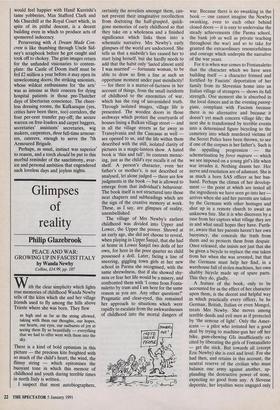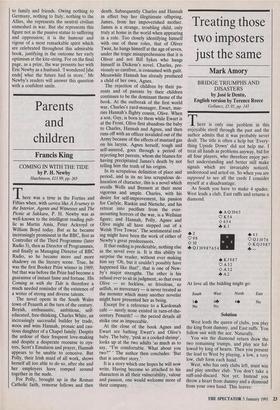Glimpses of reality
Philip Glazebrook
PEACE AND WAR: GROWING UP IN FASCIST ITALY by Wanda Newby
Collins, f14.99, pp. 187
With the clear simplicity which lights true memories of childhood Wanda Newby tells of the kites which she and her village friends used to fly among the hills above Trieste where she was born. They flew
as high and as far as the string allowed, taking with them our thoughts, our hopes, our hearts, our eyes, our outbursts of joy at seeing them fly so beautifully — everything that we had to offer went with them into the sky.
There is a kind of bold optimism in this picture — the precious kite freighted with so much of the child's heart, the wind, the flimsy string — which epitomises the buoyant tone in which this memoir of childhood and youth during terrible times in north Italy is written.
I suspect that most autobiographers, certainly the novelists amongst them, can- not prevent their imaginative recollection from doctoring the half-grasped, quick- gone memories of early childhood so that they take on a wholeness and a finished significance which links them into a schematic narrative. Mrs Newby's early glimpses of the world are undoctored. She tells us that a midwife's lies caused her to start lying herself, but she hardly needs to add that the habit only 'lasted almost until I was married' — fortunate woman, to be able to draw so firm a line at such an opportune moment under past mendacity! — for there is a matter-of-factness in her account of things, from the small incidents of childhood to the enormities of war, which has the ring of unvarnished truth. Through isolated images, village life is presented. The wooden doors in those archways which protect the courtyards of houses lining a Balkan village street — and in all the village streets as far away as Transylvania and the Caucasus as well are opened to us, and the life within them described with the still, isolated clarity of pictures in a magic-lantern show. A hated book is 'thin and tall', its contents menac- ing, just as the child's eye recalls it oil the shelf. A person's character, even her father's or mother's, is not described or analysed, let alone judged — there are few judgments in the book — but is allowed to emerge from that individual's behaviour. The book itself is not structured into those neat chapters and subheadings which are the sign of the creative memory at work. These, as I say, are glimpses of reality, unembellished.
The village of Mrs Newby's earliest childhood was divided into Upper and Lower, the Upper the poorer. Shrewd at an early age, she did not choose to reveal, when playing in Upper Sanjel, that she had at home in Lower Sanjel two dolls of her own, for here in the poor quarter no child possessed a doll. Later, facing a line of sneering, giggling town girls at her new school in Parma she recognised, with the same shrewdness, that if she showed shy- ness or fear her life would be a misery, and confronted them with 'I come from Fonta- naletto by tram and I am here for the same reason as you are. Any other questions?' Pragmatic and clear-eyed, this remained her approach to situations which were rapidly to escalate from the awkwardnesses of childhood into the mortal dangers of war. Because there is no swanking in the book — one cannot imagine the Newbys swanking, even to each other behind closed doors — it is easy to undervalue the steady achievements (the Parma school, the bank job as well as private teaching throughout the war) and so to take for granted the extraordinary resourcefulness and courage which underpin the narrative of the war years.
For it is when war comes to Fontanaletto that the character which we have seen building itself — a character formed and fortified by Fascists' deportation of her family from its Slovenian home into an Italian village of strangers — shows its full strength. One moment she is absorbed in the local dances and in the evening passeg- giata, compliant with Fascism because there is no alternative and because it doesn't yet much concern village life; the next she is transformed by terrible events into a determined figure bicycling to the cemetery into which murdered victims of the Secret Police have been thrown, to see if one of the corpses is her father's. Such is the appalling progression — the schemetisation by force majeure — which we see imposed on a young girl's life when war invades it. Nothing daunts her. Her nerve and resolution are of adamant. She is as much a born SAS officer as her hus- band. Perhaps the climax of her develop- ment — the point at which are tested all the ingredients we have seen go into her arrives when she and her parents are taken by the Germans with other hostages and shut up in a remote church to await an unknown fate. She it is who discovers by a ruse from her captors what village they are in and what small hopes they have. Furth- er, aware that her parents haven't her own buoyancy, she conceals the truth from them and so protects them from despair. Once released, she insists not just that she be given a bicycle to replace the one taken from her when she was arrested, but that the Germans must help her find, in a warehouse full of stolen machines, her own shabby bicycle made up of spare parts. This they do, gladly.
A feature of the book, only to be accounted for as the effect of her character upon them, is the decent and helpful way in which practically every officer, be he German, British, Italian or even Mongol, treats Mrs Newby. She moves among terrible deeds and evil men as if protected by 'the armour of light'. Only the Amer- icans — a pilot who irritated her a good deal by trying to machine-gun her off her bike, gum-chewing GIs insufficiently ex- cited by liberating the girls of Fontanalleto — get the stick. But towards all (except Eric Newby) she is cool and level. For she had then, and retains in this account, the neutral reserve of the civilian who must balance one army against another, ap- plauding the destructive power of none, expecting no good from any. A Slovene deportee, her loyalties were engaged only to family and friends. Owing nothing to Germany, nothing to Italy, nothing to the Allies, she represents the neutral civilian enmeshed in war. But she represents this figure not as the passive statue to suffering and oppression; it is the humour and vigour of a most remarkable spirit which are celebrated throughout this admirable book, justifying in the outcome her early optimism at the kite-string. For on the final page, as a prize, the war presents her with Eric Newby as a husband. 'I wondered [she ends] what the future had in store.' Mr Newby's readers will answer this question with a confident smile.











































 Previous page
Previous page